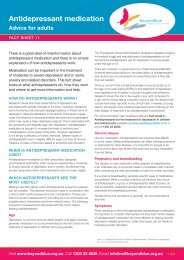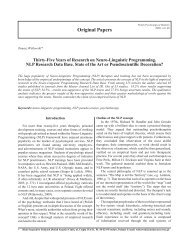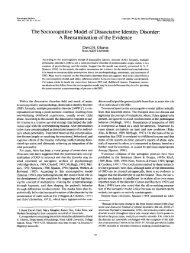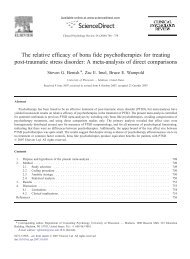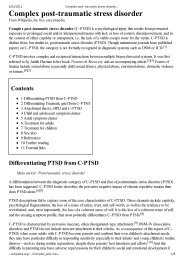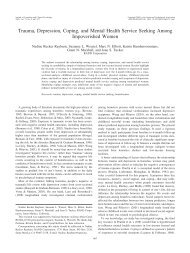Cognitive Mechanisms Underlying Recovered-Memory Experiences of ...
Cognitive Mechanisms Underlying Recovered-Memory Experiences of ...
Cognitive Mechanisms Underlying Recovered-Memory Experiences of ...
Create successful ePaper yourself
Turn your PDF publications into a flip-book with our unique Google optimized e-Paper software.
<strong>Cognitive</strong> <strong>Mechanisms</strong> <strong>of</strong> <strong>Recovered</strong> <strong>Memory</strong><br />
(BWUS PSCI 2247.PDF 12-Nov-08 22:15 105492 Bytes 7 PAGES n operator=T.Prasath)<br />
PSCI 2247<br />
through suggestive therapy are accurate, even if they cannot be<br />
corroborated.<br />
In contrast, people who believed that they had spontaneously<br />
recovered a memory <strong>of</strong> CSA showed no evidence <strong>of</strong> heightened<br />
susceptibility to false recall. This new finding significantly<br />
restricts the generality <strong>of</strong> past findings that people reporting<br />
recovered memories <strong>of</strong> CSA showed a propensity toward false<br />
recall; such effects appear to be associated with suggestive<br />
therapy, not recovery <strong>of</strong> CSA in general. Our findings also do not<br />
speak to the cognitive characteristics <strong>of</strong> people who recover<br />
memories spontaneously in therapy without suggestive techniques<br />
(Andrews et al., 1999). This population merits further<br />
study, to isolate whether some aspect <strong>of</strong> the therapeutic context<br />
itself or suggestive therapy in particular is associated with a<br />
propensity to falsely remember events that never happened.<br />
Although subjects who reported recovering memories <strong>of</strong> CSA<br />
spontaneously were no more susceptible to false memories than<br />
were control subjects, they showed a striking tendency in the<br />
FIA task to forget prior episodes <strong>of</strong> remembering when those<br />
prior retrievals had been cued differently from their current<br />
recollections. Thus, even when prior accessibility <strong>of</strong> simple<br />
events studied in the laboratory could be demonstrated objectively,<br />
this group, as a whole, was significantly more likely than<br />
the other groups to deny having remembered those events on the<br />
first test. To the extent that performance on this simple laboratory<br />
test is indicative <strong>of</strong> a broader vulnerability to forgetting in<br />
the face <strong>of</strong> shifts in context, these findings suggest that many<br />
members <strong>of</strong> this group failed to remember their prior thoughts<br />
about genuine incidences <strong>of</strong> CSA (perhaps because their way <strong>of</strong><br />
thinking about the abuse had changed).<br />
Our data do not address why people who have spontaneously<br />
recovered memories <strong>of</strong> CSA show a stronger tendency than<br />
others to underestimate their prior remembering. One possibility<br />
is suggested, however, by recent findings establishing that,<br />
in laboratory measures <strong>of</strong> thought suppression, this population<br />
shows an enhanced ability to suppress unwanted thoughts,<br />
especially if those thoughts concern negative experiences<br />
(Geraerts & McNally, 2008; Geraerts, McNally, Jelicic,<br />
Merckelbach, & Raymaekers, 2008). <strong>Memory</strong> for prior thoughts<br />
concerning the target CSA event might have been more<br />
effectively suppressed by members <strong>of</strong> this group, relative to<br />
other subjects, because those thoughts were unpleasant, and<br />
such suppression would have impaired the long-term accessibility<br />
<strong>of</strong> those memories (Anderson & Green, 2001). If appropriate<br />
cues subsequently led such a person to remember his or<br />
her abuse more completely, that experience would likely feel<br />
novel, and the person might infer that he or she had not<br />
remembered the abuse previously (i.e., the FIA phenomenon).<br />
This study is the first to establish qualitatively distinct cognitive<br />
pr<strong>of</strong>iles in different populations <strong>of</strong> individuals reporting recovered<br />
memories <strong>of</strong> CSA. The patterns <strong>of</strong> memory function we<br />
observed suggest differing mechanisms underlying recoveredmemory<br />
experiences, with some such experiences reflecting<br />
forgotten recollections <strong>of</strong> what may <strong>of</strong>ten be authentic events and<br />
others being the product <strong>of</strong> suggestive therapeutic techniques.<br />
More research will be needed to identify factors that might<br />
discriminate genuine from false recovered memories. For example,<br />
is it possible that the cognitive pr<strong>of</strong>iles associated with the<br />
two types <strong>of</strong> recovered-memory experiences go hand in hand with<br />
individual differences? More research on cognitive measures like<br />
the DRM and FIA tests, in combination with personality tests,<br />
could ultimately yield a diagnostic procedure that clinicians<br />
might use in treating their patients. Our findings also suggest the<br />
existence <strong>of</strong> stable individual differences in susceptibility to false<br />
memories and to FIA effects. These may be traits (or trait<br />
dimensions). Further research is needed to explore the generality<br />
<strong>of</strong>, for example, an individual’s susceptibility to illusory memories<br />
across conditions.<br />
In conclusion, researchers investigating recovered memories<br />
and clinicians who treat patients reporting recovered memories<br />
<strong>of</strong> CSA should take care to examine the context <strong>of</strong> recovery and<br />
to consider its implications for the mechanisms underlying such<br />
reports. Characterizing the cognitive mechanisms underlying<br />
reports <strong>of</strong> recovered memories in different contexts may be a first<br />
step in resolving controversial and <strong>of</strong>ten contradictory claims<br />
concerning the origins <strong>of</strong> recovered memories.<br />
Acknowledgments—We thank Michael C. Anderson for comments<br />
on a draft <strong>of</strong> this article. Elke Geraerts was supported by a<br />
grant from the Netherlands Organization for Scientific Research<br />
(NWO 451 07 004).<br />
REFERENCES<br />
Anderson, M.C., & Green, C. (2001). Suppressing unwanted thoughts<br />
by executive control. Nature, 410, 366–369.<br />
Andrews, B., Brewin, C.R., Ochera, J., Morton, J., Bekerian, D.A.,<br />
Davies, G.M., & Mollon, P. (1999). Characteristics, context and<br />
consequences <strong>of</strong> memory recovery among adults in therapy.<br />
British Journal <strong>of</strong> Psychiatry, 175, 141–146.<br />
Arnold, M.M., & Lindsay, D.S. (2002). Remembering remembering.<br />
Journal <strong>of</strong> Experimental Psychology: Learning, <strong>Memory</strong>, and Cognition,<br />
28, 521–529.<br />
Beck, A.T., Ward, C., & Mendelson, M. (1961). Beck Depression<br />
Inventory (BDI). Archives <strong>of</strong> General Psychiatry, 4, 561–571.<br />
Bernstein, E.M., & Putnam, F.W. (1986). Development, reliability, and<br />
validity <strong>of</strong> a dissociation scale. Journal <strong>of</strong> Nervous and Mental<br />
Disease, 174, 727–735.<br />
Brewin, C.R. (2007). Autobiographical memory for trauma: Update on<br />
four controversies. <strong>Memory</strong>, 15, 227–248.<br />
Brown, D., Scheflin, A.W., & Whitfield, C.L. (1999). <strong>Recovered</strong><br />
memories: The current weight <strong>of</strong> the evidence in science and in<br />
the courts. Journal <strong>of</strong> Psychiatry & Law, 27, 5–156.<br />
Clancy, S.A., Schacter, D.L., McNally, R.J., & Pitman, R.K. (2000).<br />
False recognition in women reporting recovered memories <strong>of</strong><br />
sexual abuse. Psychological Science, 11, 26–31.<br />
Deese, J. (1959). On the prediction <strong>of</strong> occurrence <strong>of</strong> particular verbal<br />
intrusions in immediate recall. Journal <strong>of</strong> Experimental Psychology,<br />
58, 17–22.<br />
6 Volume ]]]—Number ]]



